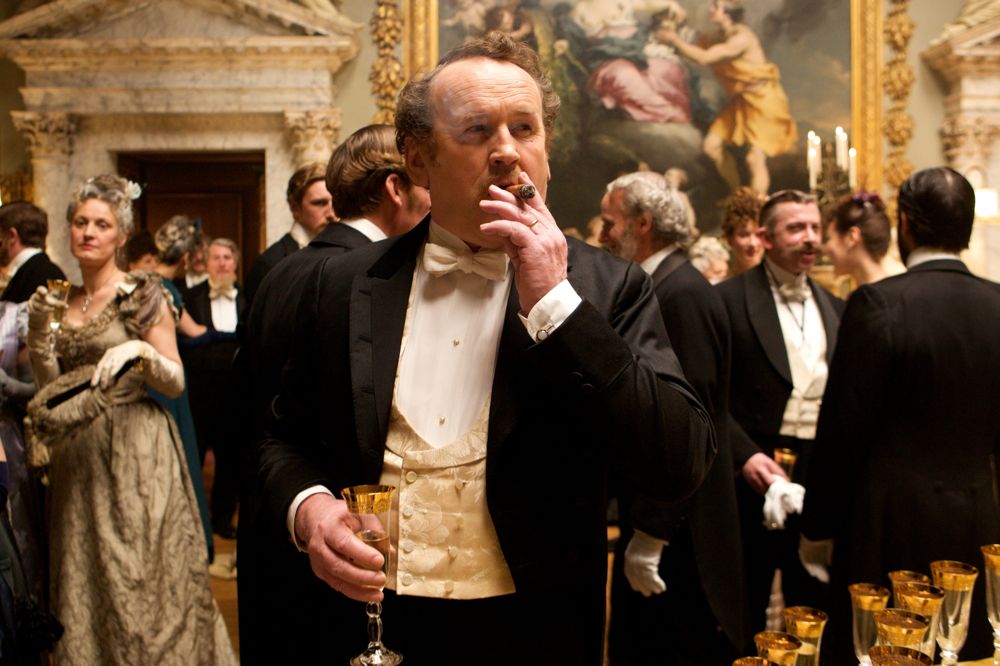Colm Meaney’s Manifest Destiny

ABOVE: COLM MEANEY IN BEL AMI. PHOTO COURTESY OF MAGNOLIA PICTURES.
Guy de Maupassant’s novel, Bel Ami, written in 1885, has a rather eerie present-day relevance. A tale of greed, money, social mobility, and masculinity, Bel Ami was Maupassant’s commentary on the growing “nouveau riche” middle class towards the end of the 19th century in France. The world Maupassant describes is one of avid consumption, where money is power, and the best way to destroy yourenemy is to sleep with his wife. In short, it is very similar to the way pop culture portrays 1980s New York (think American Psycho and Wall Street), or politics portrays a 2012 financial industry.
In the 2012 film version directed by Declan Donnellan and Nick Ormerod the protagonist Georges Duroy is played by Robert Pattinson in another one of his (quite successful) “I’m not Edward Cullen” attempts. Duroy is a penniless former soldier who goes to Paris to seek his fortune. Not the most intellectual crayon in the box, Georges realizes he has a talent for seducing women—played in the film by Kristin Scott Thomas, Uma Thurman, Christina Ricci—and tricks (in both senses of the word) his way up the Parisian social hierarchy.
Rounding out Bel Ami‘s impressive cast is Irish actor, Colm Meaney, who plays the wealthy (via suspicious means) Rousset, Georges Duroy’s ultimate rival. At 59, Meaney has a fascinatingly eclectic resume. The man’s appeared in classic blockbusters like The Last of the Mohicans (1992); independent British and Irish films; 14 seasons of Star Trek—from The Next Generation to Deep Space Nine; guest-starred on The Simpsons; acted with Kevin Spacey at London’s much-lauded Old Vic and on Broadway; and is currently starring as Thomas “Doc” Durant in AMC’s series, Hell on Wheels, about the western expansion of the American railroad just after the Civil War.
Interview recently spoke with Meaney over the phone about portraying historical figures and how film and television have changed over the past two decades.
EMMA BROWN: Hi Colm, I hear you just landed and are off to get another flight—where are you coming from and going to?
COLM MEANEY: I’m coming from Los Angeles back up to Calgary. We’re filming the second season of Hell on Wheels at the moment in Calgary.
BROWN: Well thanks for taking the time between flights. I wanted to talk to you about both Bel Ami and Hell on Wheels; I just watched Bel Ami. There is such immense tension between your character, Rousset, and Robert Pattinson’s, Georges Duroy, by the end of the film; I can’t imagine them ever finding a way to coexist. What do you think happens after the film ends?
MEANEY: No, as you say, there’s incredible tension there and these people are quite cynical; they do things for convenience or for commercial or business purposes. I think this probably would be too much to bear for all concerned.
BROWN: I imagine it ending in some sort of duel.
MEANEY: Yes, yes, perhaps or certainly in violence of some sort, a suicide or something. [laughs] I don’t see it ending well—I’ll put it that way.
BROWN: In the original book, Guy de Maupassant lists the three ambitions of Georges as lust, money, and glory. Your character on Hell on Wheels, Thomas Durant, is also a very ambitious man; what do you think his motivations are?
MEANEY: I think, initially, he was very much motivated by money. Durant is a [real] historical character. He actually started out, oddly enough, as a doctor, but very quickly moved into finance and trains. He’s reputed to have made a fortune smuggling cotton out of the South during the Civil War, so [he was] quite the cynical operator in many, many ways. But I feel that the train world kind of changes him; it becomes a passion with him, which is not just about the money. I think he’s actually prepared to lose quite a fortune. It somehow becomes a goal, it drives him forward to be the first [to build a railway across the US]—realizing what it means for the country and what it means for the opened-up West. He’s very aware that with the railroads, it’s not just a question of building the railroad to connect the east and west coasts, but it’s also the development that will come with the railroad. Of course, he is hopeful that there will be huge financial gain as well.
BROWN: He starts to get caught up with the idea of Manifest Destiny, and all that?
MEANEY: Yeah, absolutely.
BROWN: What do you think Durant would be doing professionally were he alive today?
MEANEY: Oh I think he’d be in the take of Wall Street. I think he’d be into all sorts of derivatives and such shady schemes. [laughs]
BROWN: Do you feel an obligation to honor the character of the real Thomas Durant, to find out as much as you can about what he was like? Or can you really make him your own, fictional character?
MEANEY: If you’re playing the a historical character that’s in the public consciousness, then obviously you’ve got to make an effort to look like that person and there’s a huge amount of historical record there that you have to kind of comply to. With Durant, it’s not quite like that. He’s an historical character, [but] he’s not that well-known. He’s mentioned in lots of books about the railroads, and we do know basically how his life went. He’s also, of course, dealing with a lot of fictional characters, [so] there’s a lot of room for invention there. I guess “historical fiction,” as they say. I previously played a very well-known character in an English movie about football, The Damned United [2009], Don Revie, who died in the late ’80s, early ’90s. But he was very well-known, and people knew what he looked like and what he was like and how he spoke. So it was very important to get that very accurate and very right and look like him. But with Durant, we feel that we have more of a license to invent.
BROWN: The main fictional character on the show, Cullen Bohannan, is played by Anson Mount; have you seen the Britney Spears film Crossroads, in which he plays her love interest?
MEANEY: Crossroads? No.
BROWN: Do people ask you that a lot?
MEANEY: [laughs] Yeah. No I haven’t. It’s on my list of films I’d like to see but I haven’t yet.
BROWN: I heard that you prefer doing comedy—is that true?
MEANEY: I wouldn’t say I’d prefer it. I think that may have been a question of “Do you like doing comedy?” And I do. A good comedy’s very hard to make, so good comic writing I really enjoy. I suppose I look for humor in most situations because it humanizes things; it makes a character much more three-dimensional if there’s some kind of humor. Not necessarily laugh-out-loud type of stuff, just a sense that there is a humorous edge to things. I do like that.
BROWN: Have you been able to find that in Hell on Wheels?
MEANEY: Yeah, absolutely. [laughs] I think with Durant especially, he’s a very explosive kind of guy, there are so many frustrations that depend upon him. It can be quite humorous.
BROWN: Television is such a big deal now, in a way that it wasn’t 15 years ago. How has your experience been on a TV show now compared to when you were on Star Trek in the ’80s and ’90s?
MEANEY: I think the one thing that’s really jumped out at me is the fact we now shoot on digital [film]. We shot Star Trek on 35-mm film. It’s not a difference in picture quality or anything like that, but it’s a difference in method. I was kind of quite shocked when I went on to Hell on Wheels in that sense; how the digital revolution has changed the way we do things because you’re not under that pressure that film is precious and film is expensive. In those days, because of that, we tended to rehearse more, and there was more of a structure about what we did. You would rehearse with the actors and you would rehearse with the camera and you’d lay down marks and you would rehearse the camera moves. There was much more of a structure, much more of a building-blocks kind of structure. Whereas now, because there isn’t that pressure of the expense of film, people tend to say “Oh, just shoot everything and we’ll grab what we need.” I much prefer the way we worked to the past. And also, I’ve found [digital filming] has given directors very bad habits, like shouting directions during the take. It might be bad manners and not helpful, but because it’s on digital, [directors] don’t wait until the end of the take to give you a note to do it again, they’ll simply shout, “Okay, go back three lines and look over there!” I find that very, very disturbing; it certainly doesn’t help actors give a performance.
BROWN: Do you feel that you have less control over how the show is going to turn out—that so many decisions happen in the editing room rather than on set—that it will depend less on your performance and more on what the editor does or does not cut?
MEANEY: No, the thing about Hell on Wheels is it’s so character-driven; the performances are so essential, and I tend to not to sort of accept that idea of editors taking direction during the take. In the past I’ve worked with directors who saw very much their scene in their head and knew exactly how they were going to cut it. [But] I think [some] directors have a tendency to shoot everything and to cover everything in order to have it just in case without having the vision themselves, and they then give it to the editor and let the editor put it together.
BROWN: Is that true for film as well, or is it more striking in television?
MEANEY: I think it’s creeping into film, and as I’ve said, there are more people you meet who have never shot on film before and have only shot with digital cameras, I think that’s true in the pictures as well.
BROWN: Last question: What’s the best advice you’ve ever gotten?
MEANEY: My old manager of the Irish National Theatre said “Don’t worry about being a star, just worry about being a working actor. Just keep working.” I think that’s really good advice.
BEL AMI OPENS IN THEATERS THIS FRIDAY, JUNE 8TH, AND IS CURRENTLY AVAILABLE ON DEMAND.






